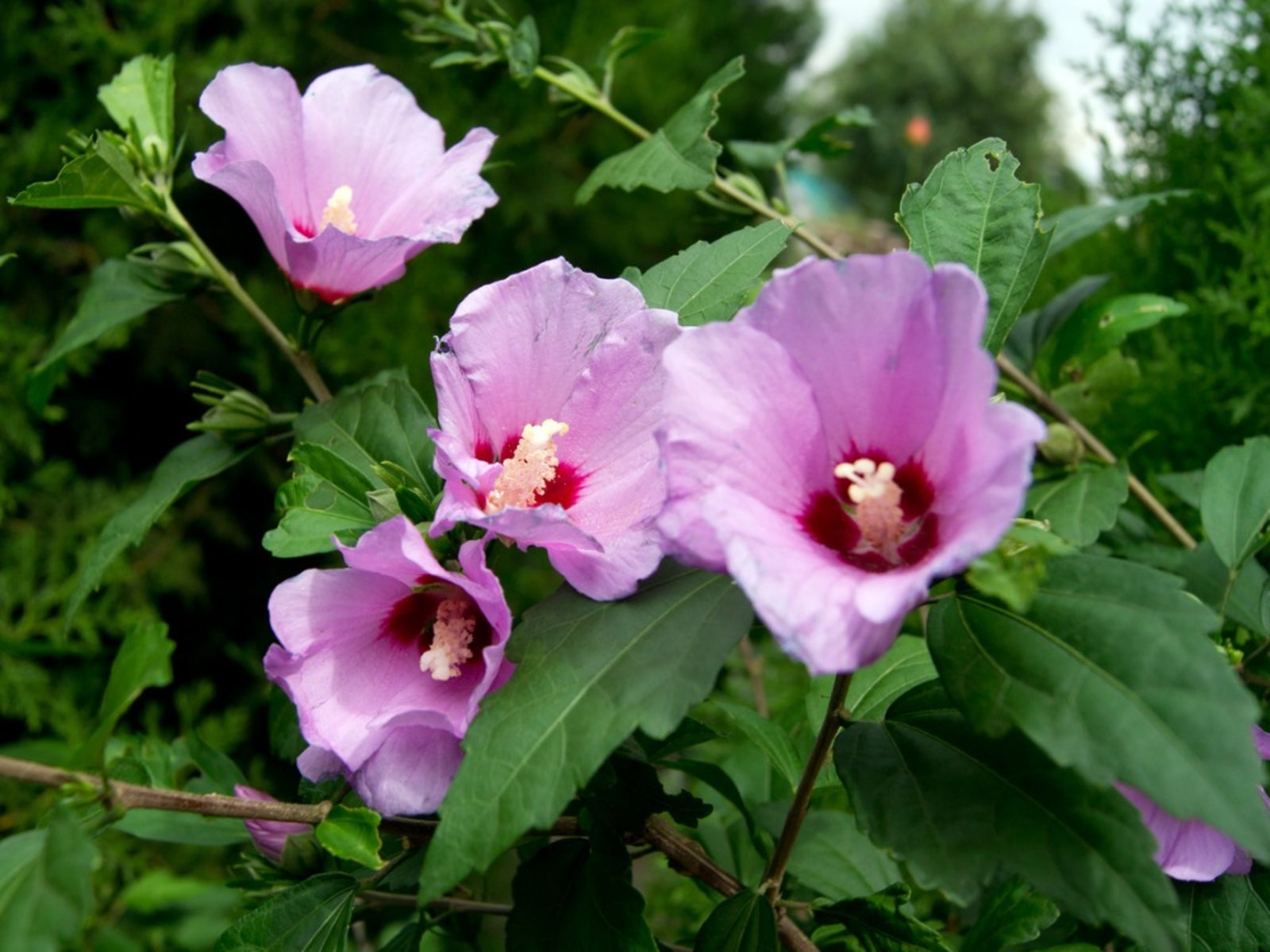Rose Of Sharon, A Complete Care And Growing Guide
The lovely, old-fashioned Rose of Sharon is a delight to grow with abundant colorful flowers that bloom into fall. Grow it as a shrub or a tree.


Sign up for the Gardening Know How newsletter today and receive a free copy of our e-book "How to Grow Delicious Tomatoes".
You are now subscribed
Your newsletter sign-up was successful
How To Grow And Care For A Rose Of Sharon
Rose of Sharon is a classic garden plant loved by homeowners for centuries. It wins fans because of its long flowering season and easy-care ways. Flowers appear in late spring and are showy and hollyhock-like, with a prominent staminal column, The plant continues blooming through fall.
A gardener doesn’t need to do much to keep this plant happy and vigorous. Care for rose of Sharon includes occasional irrigation and discretionary pruning.
Quick Facts
- Botanical name: Hibiscus syriacus
- Height: 8-12 feet (2-3.6 m)
- Spread: 6-10 feet (1.8-3 m)
- Sun exposure: Full sun to part shade
- Soil requirements: Well-draining
- Hardiness zones: 5 - 8
- When to plant: Spring or fall
Rose of Sharon Care
Light
If you are installing a rose of Sharon tree in your backyard or garden, you’ll be pleased by its tolerance. In terms of sun exposure, this hibiscus will be happy with a full sun site or a planting location in partial shade. Note that more sun will usually mean more flowers.
Water
When you are growing a rose of Sharon, keep in mind that the plant prefers moist soil. It does tolerates drought quite well but prefers regular water. A watering can, like this 2 Gallon Watering Gallon from Amazon, would help.
Temperature & Humidity
Sign up for the Gardening Know How newsletter today and receive a free copy of our e-book "How to Grow Delicious Tomatoes".
Rose of Sharon plants are hardy to zone 5, so warm winters are not a growing requirement. But they tolerate summer heat and humidity quite well too.
Soil
Like most shrubs, a rose of Sharon tree likes organically rich, moist, well-draining soil. But as long as the soil is well-draining, the plant will grow nicely.
Fertilizer
This tough plant does not need fertilizer.
Problems, Pests & Diseases
You may have to deal with plant diseases like leaf spots, blights, rusts and canker. While several insect pests - including Japanese beetles, whiteflies and aphids - visit the rose of Sharon, the only one known to cause serious damage is the Japanese beetle, if an infestation is not treated.
Planting Rose of Sharon
You won’t need an advanced degree in horticulture to plant a rose of Sharon in your yard. This plant is so ready to root and grow that it is considered invasive in some places. You can grow it from seeds, transplant a container shrub, or plant a rooted cutting.
Propagating Rose of Sharon
Rose of Sharon can be propagated by seed or by rooting stem cuttings. Can you grow rose of Sharon trees from seeds from a neighbor’s plant? You can. However, don’t expect the resulting seedlings to look the same as the parent plant. Their appearance will depend on where the pollen came from. When the new plant flowers, it may not have the exact same flower color as the parent. Note that the species plant itself will self-seed in your garden.
Pruning Rose of Sharon
Rose of Sharon accepts pruning, even severe pruning, but it is not necessary. Prune if you wish to create a tree form instead of a multi-stemmed shrub. If you want to shape the plant, prune it lightly in spring. Some gardeners believe that pruning back in winter produces larger flowers.
If you don't already have them you'll need a pair of sharp, strong pruners. The Felco F6 Pruning Shears from Amazon are ideal for small pruning jobs on vines, shrubs and trees.
Overwintering
Rose of Sharon plants tolerate temperatures down to about 0 degrees F. (17.7 C.). If your area gets colder in winter, you can grow it in a container and overwinter it indoors, returning it to the outdoors once all possibility of frost has passed.
Rose of Sharon Varieties
You can find cultivars of the rose of Sharon available in commerce. They offer different color blossoms and different growth types. For example, Admiral Dewey produces single, white flowers; while Ardens has purple, semi-double blossoms, Lucy has dark pink, double flowers, and Red Heart grows single pure white flowers with a deep red center.
FREQUENTLY ASKED QUESTIONS
When Does a Rose of Sharon Bloom?
If you are growing a rose of Sharon, expect blossoms from early summer through late fall. However, different cultivars may have different bloom periods so be sure you know about the plant before you buy it.
Is Rose of Sharon Invasive?
Rose of Sharon plants self-seed prolifically. They are considered invasive in some eastern states.

Becca Badgett was a regular contributor to Gardening Know How for ten years. Co-author of the book How to Grow an EMERGENCY Garden, Becca specializes in succulent and cactus gardening.